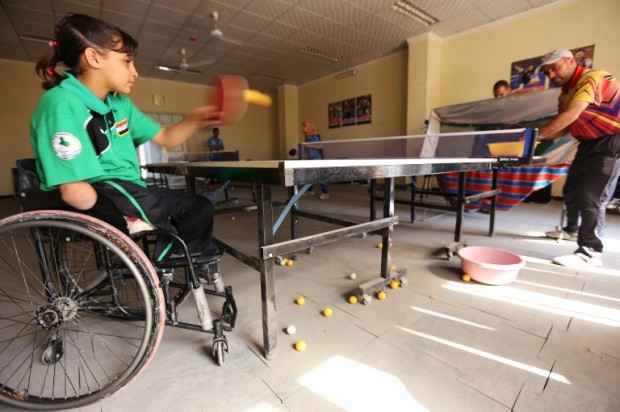Wounded in bombing, Iraq girl now rising table tennis star

Twelve-year-old disabled Iraqi Nejla Imad plays table tennis in Baquba, a city northeast of Baghdad, on February 20, 2016.
Imad, like tens of thousands of Iraqis, is a victim of the bombs that have terrorised the country for well over a decade. A roadside bomb ripped into her family’s car in Baquba, a city northeast of Baghdad, when she was just three years old, taking much of her right leg, part of her left and her right forearm.
/ AFP / SABAH ARAR
Twelve-year-old Iraqi Nejla Imad holds a white table tennis ball against her bat with her thumb, flicks it into the air and sends it bouncing over the net.
She does this with her left hand while sitting in a wheelchair: Imad, like tens of thousands of Iraqis, is a victim of the bombs that have terrorized the country for well over a decade.
A roadside bomb ripped into her family’s car in Baquba, a city northeast of Baghdad, when she was just three years old, taking much of her right leg, part of her left and her right forearm.
Despite these injuries, she took up table tennis when she was four and is now a rising Paralympic star.
“Table tennis… has begun to change my life for the better,” says Imad, who wears a green jersey with her country’s flag on the front and “Iraq” written across the back.
“My self-confidence is increasing day after day,” she says.
The kindness she has been shown has also helped her deal with the pain of her injuries.
“I see the people around me show sympathy to me, and their readiness to help me, especially when I am outside the house, and this is something important that greatly eased the physical and psychological pain after I became handicapped,” Imad says.
Imad trains in Baquba three times a week and also journeys to Baghdad twice a week to practice with the national under-16 Paralympic team.
In Baquba, she practices with four other girls — one who was paralyzed by a mortar round and three who were disabled from birth — in a sports centre with pictures of table tennis stars on the walls.
Skilled, confident player
Her coach in Baquba, Hossam Hussein, says that Imad won medals in several local competitions, drawing the attention of the National Paralympic Committee, which invited her to join the Iraqi under-16 team.
“Nejla is one of the most skilled players on the table tennis team. She has great skills and great confidence in herself,” says Hussein, predicting that Imad has a bright future ahead of her.
In 2015, Imad placed second in the Iraqi championships for disabled players under age 16, and also won silver at the Arab championships the same year.
Jassem Katib Mezal, the coach of the national team, says Imad will not feature at this year’s Paralympics, but the young athlete hopes to do so later on.
“I hope to be with the Iraqi teams in future Olympic competitions,” Imad says.
She lives in a small house on the outskirts of Baquba with her four sisters and two brothers, and is continuing her studies alongside her table tennis training.
Imad’s mother says the many trips to Baghdad — some 60 kilometres (37 miles) of checkpoints and traffic jams away — are tiring, and the 100,000 Iraqi dinars (about $80) she receives per month for transport do not fully cover the expense.
“But I feel her happiness and I see her practicing the sport, and this reduces all my troubles,” says her mother, who asked not to be identified by name.
“We are proud of… Nejla and her teammates,” says Samir al-Kurdi, the head of the Iraqi table tennis federation for the disabled.
Table tennis is a source of both motivation and pride for Imad as well.
“Practicing the sport gives me a lot of mental motivation, and I have begun to feel proud,” she says.